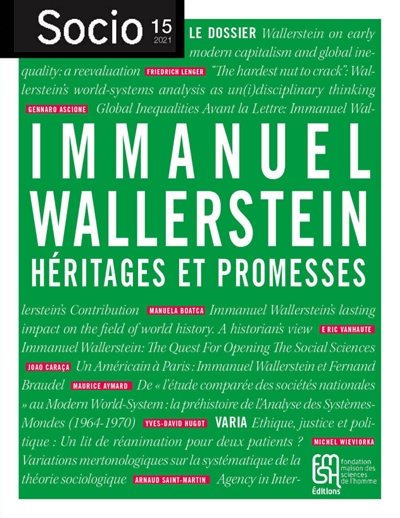
Socio. n° 15, Immanuel Wallerstain : héritages et promesses
Socio 15 2021
« Cette volonté de déconstruire et de reconstruire les «structures de la connaissance », jusqu'à revenir sur la séparation entre la recherche du vrai et celle du bien, dérive à son tour du but qu'immanuel Wallerstein assigne à la science sociale : contribuer à l'émancipation humaine. »
Stéphane Dufoix et Yves-David Hugot
« [...] il avait identifié en Fernand Braudel l'historien qui détenait la clé de ce " long XVIe siècle " qui marquait le point de départ de ce système, et représentait donc pour lui la première instance de validation scientifique. Mais aussi l'historien qui pourrait d'autant mieux comprendre de l'intérieur la nouveauté et le sens de son projet, l'accompagner et dialoguer avec lui, qu'il en avait proposé, dans La Méditerranée et à partir d'elle, certains des principaux mots-clés [...]. »
Maurice Aymard
« Immanuel Wallerstein titled his last commentary ' This is the end ; this is the beginning. ' His massive work on world-systems analysis has come to an end. The debates on how his work has affected and will affect global approaches in human and social sciences have only begun. »
Eric vanhaute
« Immanuel Wallerstein's 1974 formulation of the tenets of world-systems analysis was a radical step. His was a dissident position not only because it criticized and questioned basic assumptions of social science, but mainly because it did not stop at suggesting that they should be revised. It claimed the necessity of unthinking those assumptions. »
Manuela Boatcă
« Modernity, which for more than two centuries has been the major ideological means of managing Western supremacy within the international System, is now the theoretical space of confrontation between many powers and different counter- powers seeking to establish who modernity belongs to, and what it is, was and will be. »
Gennaro Ascione
